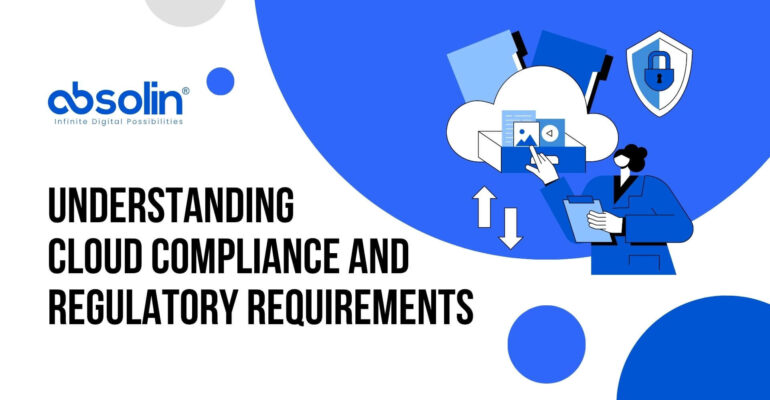Understanding Cloud Compliance and Regulatory Requirements
The cloud is like an open sky for modern businesses which is limitless, empowering, and filled with possibilities. It lets teams collaborate across continents, scale infrastructure overnight, and store vast amounts of sensitive data effortlessly.
But here’s the catch: the same sky can turn into a storm if compliance isn’t part of the flight plan. Regulations aren’t suggestions; they’re the guardrails that keep businesses safe from financial penalties, data breaches, and reputational damage. And in the cloud, those guardrails stretch across borders, industries, and ever-evolving legal landscapes.
Cloud adoption isn’t just about agility and innovation anymore. It’s about responsible innovation. Understanding cloud compliance and regulatory requirements isn’t a box to tick at the end of a project rather it’s the foundation for building trust, resilience, and longevity in a digital-first world.
1. What is Cloud Compliance?
Cloud compliance refers to ensuring that your cloud infrastructure, applications, and data handling practices meet relevant regulatory, legal, and industry-specific standards.
These requirements define:
- How data is stored and processed
- Who can access it and how
- Where data can reside geographically
- What security and audit measures are mandatory
Compliance is what makes the cloud not just efficient, but secure, trusted, and legally sound.
2. Why Compliance Matters More Than Ever
The rise of cloud computing has blurred traditional borders. Your customer could be in New York, your server in Frankfurt, and your team in Singapore. With that comes a web of overlapping regulations — GDPR, HIPAA, PCI DSS, ISO standards, SOC 2, and more.
Key reasons compliance can’t be ignored:
- Regulatory Penalties: Non-compliance can result in millions in fines and legal exposure.
- Customer Trust: Compliance signals responsibility and safeguards your reputation.
- Operational Resilience: A compliant infrastructure is inherently more secure and stable.
- Market Access: Many industries require certifications before you can operate.
In short: compliance isn’t a burden; it’s a business enabler.
3. Common Regulatory Frameworks and Standards
Here are some of the most widely recognized compliance standards in the cloud ecosystem:
| Regulation / Standard | Scope | Key Focus |
| GDPR (General Data Protection Regulation) | EU | Data privacy and consent, cross-border data transfer |
| HIPAA (Health Insurance Portability and Accountability Act) | US | Protecting sensitive healthcare data |
| PCI DSS (Payment Card Industry Data Security Standard) | Global | Securing credit card and payment data |
| SOC 2 (Service Organization Control) | Global | Data security, availability, processing integrity |
| ISO/IEC 27001 | Global | Information security management systems |
| CCPA (California Consumer Privacy Act) | US (California) | Consumer data privacy rights |
Businesses often fall under multiple frameworks simultaneously, depending on their industry, geography, and customer base.
4. Key Pillars of Cloud Compliance
🛡 1. Data Protection & Privacy
Encrypt data at rest and in transit, manage access through identity and access management (IAM), and set up geo-specific storage protocols.
📜 2. Governance & Documentation
Maintain a clear record of how data is handled, who has access, and what policies are in place. Auditors love documentation — and so should you.
🔍 3. Continuous Monitoring
Compliance isn’t a one-time checklist. Regular vulnerability assessments, threat detection, and real-time monitoring keep systems aligned with evolving standards.
🔐 4. Access Control & Authentication
Strong access control policies ensure that sensitive data doesn’t fall into the wrong hands. MFA (multi-factor authentication) and least privilege principles are key.
🧭 5. Vendor & Third-Party Management
Even if you’re compliant, your vendors must be too. Many breaches originate from third-party gaps.
5. Common Compliance Pitfalls Businesses Face
- Assuming the cloud provider handles everything — In reality, compliance is a shared responsibility between you and your cloud vendor.
- Treating compliance as a one-time task — Regulations evolve; so must your compliance posture.
- Lack of visibility into data flows — You can’t protect what you don’t track.
- Ignoring regional differences — A regulation that applies in the EU may not be the same in the US or APAC.
- Underestimating human error — Untrained teams and misconfigurations are among the top causes of compliance failures.
6. Building a Sustainable Cloud Compliance Strategy
To stay ahead of regulatory requirements, businesses need more than reactive checklists — they need a well-structured compliance framework:
✅ Conduct regular compliance audits and gap assessments.
🧠 Train employees on security protocols and data handling.
🔐 Implement encryption, IAM, and network security best practices.
🌍 Choose cloud providers that align with global standards.
⚡ Automate compliance monitoring where possible.
📝 Keep documentation and policies updated for evolving regulations.
Conclusion: Compliance Isn’t a Wall — It’s a Launchpad
For too long, businesses have treated compliance like a barrier — a box to check, a cost to bear, or a delay to innovation. But in reality, compliance is what enables innovation.
When your cloud infrastructure is built on a foundation of compliance, it creates trust with customers, opens new markets, and builds resilience against ever-evolving threats. It’s like reinforcing the wings of your aircraft before takeoff — so you can fly faster, higher, and safer.
In the modern cloud era, compliance isn’t a chore. It’s a strategic advantage.
Where Absolin Can Help
At Absolin, we help businesses navigate the complex world of cloud compliance with clarity and confidence. Our team works with you to:
- Assess your current cloud architecture against regulatory frameworks.
- Implement security and compliance best practices tailored to your industry.
- Automate monitoring and reporting to keep you ahead of evolving requirements.
- Ensure seamless integration with GDPR, HIPAA, PCI DSS, ISO, SOC 2, and other key standards.
Whether you’re scaling globally or strengthening your existing cloud plan, Absolin ensures compliance becomes your growth enabler, not your bottleneck.
With Absolin by your side, your business can soar through the cloud safely, securely, and strategically.



